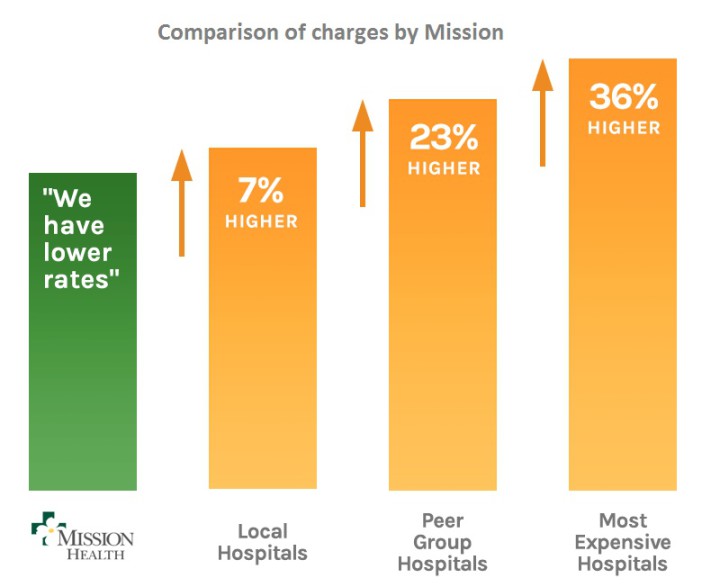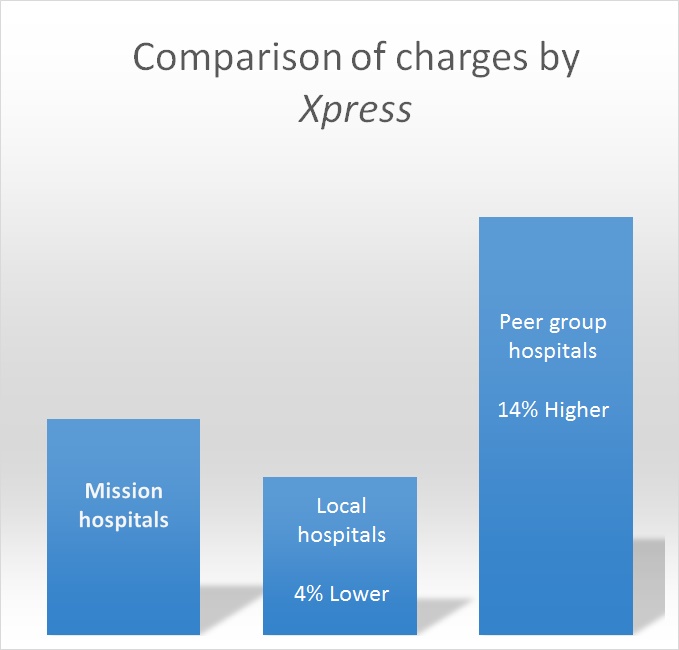By Nick Wilson, Virginia Daffron, Susan Foster and Max Hunt
wellness@mountainx.com
As Mission Health and Blue Cross Blue Shield of North Carolina engage in a high-profile, high-stakes contract dispute that could result in local residents paying more for care at the region’s largest health service provider, many say they are losing patience with the wrangling.
“I think that these two megacorps should be ashamed of themselves for playing hardball with each other at the expense, mental and emotional, of their clients. This has caused a lot of unnecessary stress on people, including people who are ill,” Debbie Peterson of Asheville tells Xpress. “To threaten loss of insurance coverage, and that is pretty much what it is, should not be allowed and customers should not be used as pawns.”
Some even say they are considering moving to a different state to ensure they can receive care if the two parties don’t come to an agreement, while others, like local physician Daniel Hey, believe the very public battle is “brinksmanship” that will eventually be resolved.
“I pay top dollar for my high-deductible coverage,” says Elizabeth Gullum of Marshall, sounding a fatalistic note about the outcome of the dispute. “I guess now it’s just a matter of hoping I don’t get sick.”
Opening salvo
The impasse between Mission Health and Blue Cross became public on July 5, when Mission declared its intent to terminate its network contract with the insurer by midnight Oct. 4 if Blue Cross does not agree to higher reimbursement rates for Mission services.
Mission Health operates six hospitals and a number of outpatient and surgery centers. The sixth-largest health system in the state, Mission employs over 10,000 workers, including over 1,000 physicians. It operates the region’s only Level II trauma center and long-term acute care hospital.
If Mission Health’s contract with Blue Cross ends, patients covered by insurance plans offered by Blue Cross will have to pay higher, out-of-network rates for care at all Mission facilities and practices starting Oct. 5. Emergency care, Mission Health points out, would continue to be provided at lower in-network rates for all customers even if the dispute is not resolved.
According to Rowena Buffett Timms, Mission’s senior vice president of government and community relations, about 70 percent of the health system’s patients are covered by Medicare or Medicaid, or are uninsured. About a quarter of Mission’s patients are covered by commercial insurance. Of those, about 70 percent get their insurance from Blue Cross. Over the last 12 months, Buffett Timms says, nearly 130,000 Blue Cross customers received care from Mission.
Blue Cross is the only insurance carrier that offers individual coverage through the Health Insurance Exchange in Western North Carolina. While employers who provide health insurance to their workers could switch to a new insurer, for exchange customers covered under the provisions of the Affordable Care Act, Blue Cross is the only option.
Battle lines
Rising health care costs lie at the heart of the dispute.
“BCBSNC’s latest proposal imposes effective payment rate reductions to our health system at a time when modest annual increases are more important than they have ever been,” said Charles Ayscue, senior vice president, finance, and chief financial officer at Mission Health, in the July 5 announcement.
The terms of the automatic, zero-increase renewal that would have gone into effect if Mission Health had not announced its intent to terminate its contract with Blue Cross, Mission claims, would “create an effective payment reduction of $296 million over five years for Mission Health System, creating a massive financial shortfall we cannot overcome.”
“Although we aren’t allowed to disclose BCBSNC’s specific offer due to a confidentiality provision, we would be happy to disclose all details if BCBSNC will agree to waive the confidentiality provision,” says Buffett Timms. “We can say categorically that we would be better off accepting their automatic renewal with forever-zero rate increases rather than the last offer that they had on the table. I don’t know why they would say otherwise, but it seems as if they are disclosing only one portion of their prior offer.”
But the upshot, she continues, is that the “offer, when combined with other significant price reductions for certain services, leads to an all-in offer that we believe to be worse than the forever-zero automatic renewal. This really isn’t an opinion; it’s a math calculation.”
Meanwhile, costs — for drugs, medical equipment and supplies and, critically, labor — continue to rise, while payment rates from Medicare and Medicaid remain flat or are declining, Buffett Timms explains.
Melissa Biediger, communication specialist at BCBCNC, disputes Mission’s take on the contract negotiations. She claims it is inaccurate for Mission to claim that BCBSNC has forced a choice between a zero percent rate increase and a reduction in fees. “That’s not true,” she says. “Blue Cross NC proposed a slowdown of their price increases. More than 40 other hospitals in the state have agreed to keep costs down for customers.”
She adds that Mission “has demanded rate increases that would contribute directly to higher premiums and out-of-pocket costs for customers. Despite our reasonable proposal to slow the increase of medical costs, Mission Health refused to budge.”
Because of the confidentiality agreement in place between the parties, it is impossible for consumers to know what the terms of the negotiations have actually been to date.
Complicated arithmetic
Biediger says the company’s customers “already pay more for care at Mission Health than many other health systems in the state.” She claims that “Mission Health is among the most expensive facilities in the area for common inpatient procedures.”
Buffett Timms counters this claim, citing the North Carolina Department of Health and Human Services’ independently maintained data (avl.mx/426), “which shows Mission Hospital’s charges are on average 23 percent below its peer group average, 36 percent below the most expensive peer group hospitals, and 7 percent below the average of the other local hospitals in Western North Carolina.

In order to provide some adjudication of these contradictory claims, Xpress conducted its own data analysis, using NCDHHS data, of a sample of nine common inpatient procedures: gall bladder removal (with and without complications), lower-extremity procedures, hip and femur procedures, Cesarean section (with and without complications), lower-extremity joint replacement and vaginal delivery (with and without complications).

Results indicated that Mission was actually four percent more expensive on average than local hospitals on these procedures but 14 percent cheaper on average than regional peer group hospitals. Comparisons to the most expensive hospitals were not made.
Buffett Timms says comparable pricing at Mission was determined by examining the NCDHHS data base for all 100 inpatient diagnoses. Discrepancies between Mission’s cost calculations and those by Xpress may relate to the smaller number of procedures sampled by Xpress (nine).
Although Xpress was not able to make a full comparison based on all procedures offered, our preliminary analysis suggests that Mission’s charges are not among the most expensive in the state. Our sample data show charges approximately on par with those of other local hospitals and substantially cheaper than regional peer group hospitals.
Going up
Explaining that he obtained health insurance coverage for the first time four years ago through the Affordable Care Act, 63-year-old Fairview resident John Stevenson says, “So I was very thankful for that, but I am shocked that my premium has basically doubled in the last three years. I pay over $1,100 a month for a $6,000 deductible, which just stuns me.”

Stevenson continues: “I feel like myself and anybody who is insured by Blue Cross is getting caught in the middle and getting squeezed inappropriately and unfairly. We don’t have enough choices to begin with, and for them to not be able to come to some sort of agreement just seems ridiculous to me.”
A lack of price transparency complicates the problem, according to John Wingerter, director of insurance services at the Council on Aging of Buncombe County. “People are having less access, and it’s just getting more expensive for insurance,” he says. “And unfortunately insurance distorts things because most folks have no idea as to the true costs of an office visit or a surgery or an ambulance run or whatever it is, because they have a copay, and they have no idea.”
Buffett Timms agrees that the confusing pricing situation created by the U.S. healthcare system “makes no sense at all to a normal person and really needs to be addressed.” Because of the widely differing provisions of multiple versions of coverage plans offered by insurers, “it is literally not possible to provide a generic answer [about the price of a procedure] to everyone.” Furthermore, she continues, “because any given patient is in a specific stage of his or her deductible and copay requirements, the ‘real price’ to consumers could vary widely even with the exact same health plan and depending on the time of year.”
Any patient who requests an estimate of the actual cost of a service in advance, she says, can receive that information through Mission.
Still, says retiree Cassie Dillon of South Asheville, “This fight is an excellent example of why our health care system is a disaster. Health care should be treated as a common good supported by a single-payer system. None of us are capable of making a fully informed decision, so normal market forces do not apply.”
Winning hearts and minds
Both sides of the debate seem committed to taking the fight to the court of public opinion. Ads from Blue Cross have appeared in local newspapers and on billboards, radio and television. The insurer is also placing sponsored ads in Google web searches.
A message from Mission Health CEO Ron Paulus posted on the health system’s blog on Aug. 9 asserts, “Mission’s resources must be used to benefit our community, not for advertising battles. We will never match Blue Cross dollar-for-dollar or ad-for-ad, and we never should.” But the system isn’t taking the public relations assault lying down.
Mission repeated its talking points on social media, hosting a Facebook Live event with Paulus on Aug. 11, followed by weekly video updates. Mission Health has launched a website dedicated to providing information on the controversy at standwithmission.org and is engaged in social media campaigns using the hashtags #standwithmission and #missionstandswithyou. Mission has also placed print advertisements in local publications, including Xpress.
The information campaigns, however, can overwhelm consumers. “It’s really hard to know which slick PR firm to believe,” commented one viewer of the Facebook Live event.
“I work for the state and have already received a notice from BCBS stating that the contract will not be renewed come Oct. 5. Meanwhile I still see ads, billboards and social media communication from both parties requesting the other to continue to negotiate and playing the blame game. I don’t know what to think,” says Asheville resident Tatiana Calder.
Ripple effects
With the relationship between Mission Health and Blue Cross in limbo, other regional healthcare providers and services are preparing for a possible migration of BCBS patients from Mission to their facilities.
Park Ridge Health System, which oversees more than 30 locations in Henderson, Buncombe and Haywood counties, is already experiencing an uptick in customer service calls since Mission and Blue Cross Blue Shield began squaring off in July, according to Victoria Dunkle, communications director for Park Ridge.
“We’ve really been letting folks know that we’re here to help — that’s the overarching message,” says Dunkle. “The entire Park Ridge Health team and family don’t want to see our friends and neighbors going through this stress, fear and uncertainty surrounding their health care options. We’re ready to help anybody who comes to us seeking care.”
Biediger of Blue Cross comments on Park Ridge’s offer to help take up the slack: “We are grateful to Park Ridge for offering support and assistance to Blue Cross NC customers seeking in-network care during this time. Park Ridge Health’s combined network of more than 250 medical providers includes more than 35 primary care providers and nearly 100 specialists representing more than 30 specialties.”
Dunkle refers any patients curious to know more about Park Ridge’s services to visit parkridgehealth.org/answers or call 855-PRH-LIFE for more information. “We accept all insurances, including Medicaid,” Dunkle notes. “We combine primary and specialty care, as well as hospital services, from prenatal to end-of-life stages.”
For services that Park Ridge doesn’t offer within its own network, the organization has an extensive network of providers across the region and state that patients can be connected to, according to Dunkle. “If we can’t meet their need, we will make sure that we do the best to make sure every patient reaches his or her whole-person care,” she notes. “We’re in that journey with them for health and wellness, and that’s what it’s all about, at the end of the day.”
Retired educator Tery Higgins lives in the city of Asheville and is insured by Blue Cross. Her home, she points out, is just a few miles away from Mission Hospital. But if her insurer and her hospital can’t come to terms, she says, “I will travel down the road and use Park Ridge Hospital. I have had a few surgeries there and I was very pleased with the facility and the staff.”
Still, finding new doctors who aren’t affiliated with Mission would be “a major pain,” Higgins says.
Other health care providers, such as UNC Health Care’s Pardee Hospital in Hendersonville, are hopeful that Mission and BCBS will resolve their differences before it becomes as issue for other regional providers. “We, like most, want to see these two partners sit down and sort this out in a fair and reasonable manner for the folks of Western North Carolina,” says James M. Kirby II, president and CEO of Pardee UNC Health Care. “[Patients] will want to remain close to their existing primary care providers and family doctors. I am confident Mission and BCBS want that as well.”
While Kirby doubts that Pardee will see more than a temporary spike in the number of patients coming from Mission to Pardee as the deadline approaches, he adds that “Pardee is always here to help our patients and our community.”
Pick your provider
For local emergency service providers, the Mission/Blue Cross dispute, while worth watching, should have little effect on the ability to provide ambulance service to those in need, says William Payne, EMS operations supervisor for Buncombe County. “Most of everything we do is a 911 emergency call, anyhow, so we could still take them to Mission, and Blue Cross would still cover it; it’d just be a higher copay for the patient,” he says.
While EMS officials have informally discussed potential impacts on their service if Mission and the insurer can’t come to an agreement, Payne says no official policy has been put in place yet. For those needing non-emergency transportation, Payne notes that Buncombe County EMS already offers the option to be transported to several Buncombe County health care facilities, including Mission, The Charles George VA Medical Center and Park Ridge.
“Theoretically, just as we’re operating right now, if someone determined that they did want to go to an alternative destination besides Mission, it would be Park Ridge or the VA,” says Payne.
However, transportation fees for ambulance services could be higher if EMS has to travel farther to take a patient to another hospital, says Jerry Vehaun, emergency services director for Buncombe County. “There may be a little additional charge for mileage, but if the patient has been going to Park Ridge or other facility, they are expecting the cost.”
Currently, adds Payne, Buncombe County’s ambulance service charges approximately $8.75 a mile.
A national trend
While many local residents see the fissure between Mission Health and Blue Cross as a singularly disruptive event, similar contract disputes have occurred in a number of communities around the country — between health care systems and Blue Cross Blue Shield as well as other insurers.
On July 7, for example, Children’s Minnesota and Blue Cross Blue Shield of Minnesota reached a contract agreement after Children’s terminated its previous contract with the insurer at midnight on July 4, in a dispute similar to the one that’s playing out in Asheville now.
Industry observer Molly Gamble, who is editor-in-chief of Becker’s Hospital Review, says such feuds are becoming more common and much more public than in the past. Her publication tracked 35 contract disputes that were active across the country in the first half of 2017.
“If you don’t know the rates the payer is paying and what the hospital system is asking for,” Gamble says, “it’s pretty difficult to make a judgment on the merits of the arguments of the two sides.” Since contracts almost always require confidentiality, however, information that could yield a definitive conclusion about which party’s claims are stronger simply isn’t available to the public.
Asked to comment on Mission Health’s claims that 70 percent of the system’s care goes to Medicare, Medicaid or uninsured patients, Gamble says, “That is high. That’s almost like a safety-net-level hospital in a large urban area.” Given that statistic, she says it isn’t surprising that the system needs an increase in reimbursement rates for patients with commercial coverage to cover its costs.
Looking back over the past several years, Gamble has seen a number of instances in which systems and insurers have reached a deal after a contract termination deadline has passed. While patients may experience inconvenience and disruption in the short term, most disputes end with the parties coming to some kind of agreement.
“I can’t with confidence detail any incidents where a contract dispute wasn’t eventually resolved,” Gamble says, which may come as reassuring news to local residents worried about the potential impact of a permanent split.
With additional reporting by David Floyd



Before you comment
The comments section is here to provide a platform for civil dialogue on the issues we face together as a local community. Xpress is committed to offering this platform for all voices, but when the tone of the discussion gets nasty or strays off topic, we believe many people choose not to participate. Xpress editors are determined to moderate comments to ensure a constructive interchange is maintained. All comments judged not to be in keeping with the spirit of civil discourse will be removed and repeat violators will be banned. See here for our terms of service. Thank you for being part of this effort to promote respectful discussion.